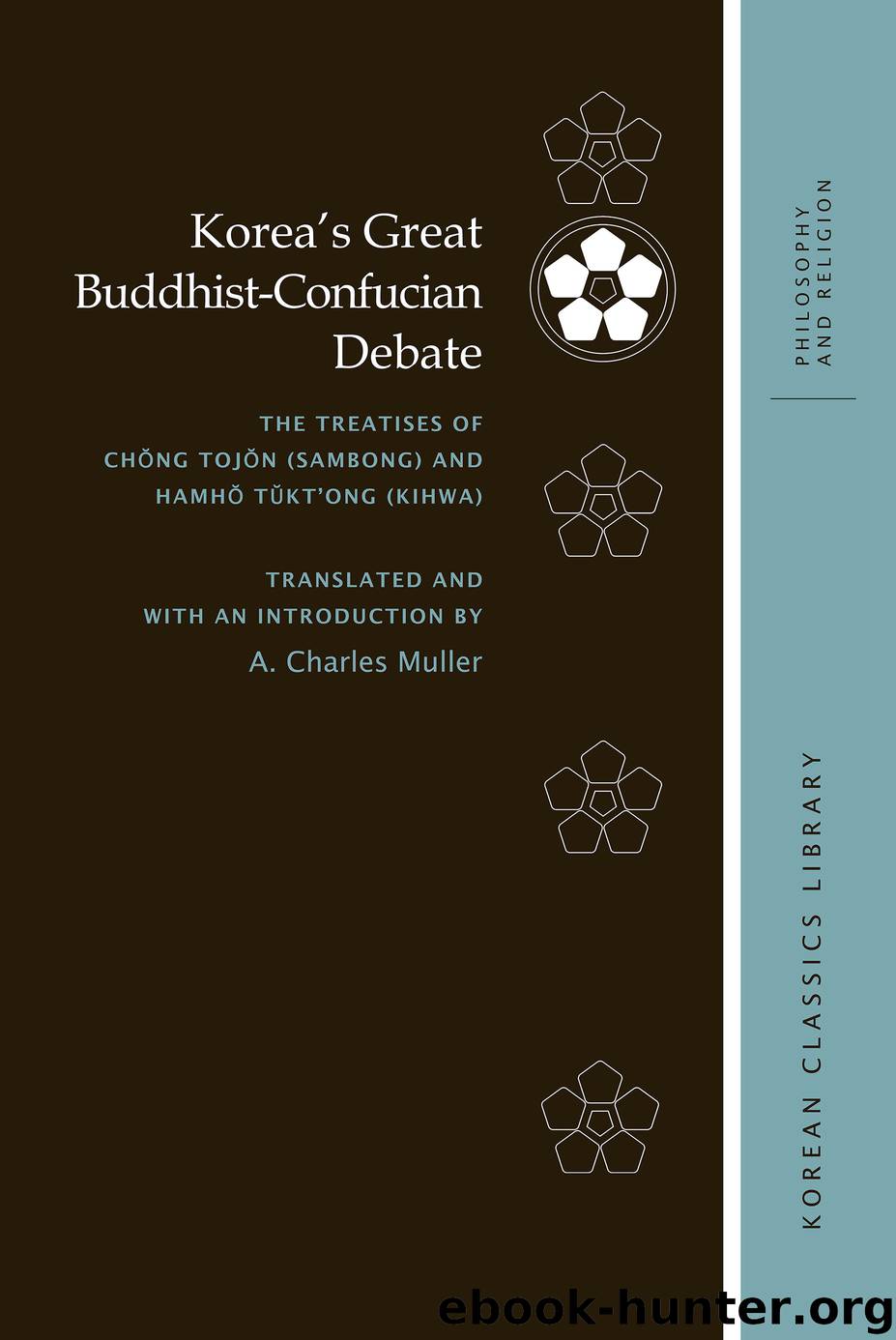Korea's Great Buddhist-Confucian Debate by A. Charles Muller

Author:A. Charles Muller
Language: eng
Format: epub
Publisher: University of Hawaii Press
Published: 2015-09-04T16:00:00+00:00
Killing life in order to nourish life is like one’s own child killing a sibling in order to nourish itself. If children are killing each other in order to nourish themselves, how are the parents going to feel about this? To have their children killing each other is certainly not the parents’ wish. So how could the mutual inflicting of harm between human beings and the other creatures be the will of heaven and earth? Human beings and the myriad things already share in their possession of the material force of heaven and earth. They also share in their possession of the principle of heaven and earth and dwell together in the space of heaven and earth. Sharing as they do in the same material force and the same principle, how could there be a principle that condones the killing of life in order to nourish life? It is like the saying “heaven and earth and I share the same root, the myriad things and I share the same body”39—these are the words of the Buddha. “The man of humanity forms one body with heaven and earth and the myriad things”40—these are the words of a Confucian. Only when one’s actions fully accord with these words can we say that someone has fully achieved the Way of humaneness.
7. The Meaning of Humaneness
The term in the medical texts for numbness in the hands and feet is “non-humaneness.”41 The hands and feet are the extremities of the body. Even if one has only a slight sickness, the material force will not penetrate them. Therefore humaneness implies the interpenetration of heaven and earth and the myriad things into a single body wherein there is no gap whatsoever. If you deeply embody this principle, then there cannot be a justification for inflicting harm on even the most insignificant of creatures. This, indeed, can be called the actualization of the Way of the humane man.
It is like the stories of the goose and the pearl42 and the monk tied by the grass.43 This is the kind of person we are referring to here. If one’s actualization of humaneness is not like this, then between humans and creatures, material force is obstructed and does not flow; the principle is blocked and does not penetrate. It is like the numbness of the hands and feet. This is why the name in the medical texts for a healthy condition is “humaneness.”
The Book of Odes says, “One arrow for five boars.”44 The Analects says, “When fishing, the master would not use a net; when hunting, he would not shoot at a perched bird.”45 The Mencius says, “The noble man keeps his distance from the kitchen, for if he hears the screams of slaughtered beasts, he cannot stand to eat their meat.”46 It also says, “If fine-mesh nets are not used for fishing, there will always be fish and turtles for eating in abundance.”47 These are all examples of an incomplete practice of humaneness. Why don’t they live up to
Download
This site does not store any files on its server. We only index and link to content provided by other sites. Please contact the content providers to delete copyright contents if any and email us, we'll remove relevant links or contents immediately.
| Confucianism | Feng Shui |
| I Ching | Jainism |
| Karma | Shintoism |
| Sikhism | Tao Te Ching |
| Taoism | Tibetan Book of the Dead |
| Zoroastrianism |
The Tao of Physics by Fritjof Capra(1848)
The Diamond Cutter by Geshe Michael Roach(1671)
Feng Shui by Stephen Skinner(1616)
Human Design by Chetan Parkyn(1574)
The Alchemy of Sexual Energy by Mantak Chia(1490)
Tao Te Ching by Lao Tzu(1485)
365 Tao: Daily Meditations by Ming-Dao Deng(1301)
Tao Tantric Arts for Women by Minke de Vos(1260)
Sun Tzu's The Art of War by Giles Lionel Minford John Tzu Sun(1246)
Karma-Yoga and Bhakti-Yoga by Swami Vivekananda(1221)
Sidney Sheldon (1982) Master Of The Game by Sidney Sheldon(1187)
Buddhism 101 by Arnie Kozak(1185)
The Analects of Confucius by Burton Watson(1145)
The Art of War Other Classics of Eastern Philosophy by Sun Tzu Lao-Tzu Confucius Mencius(1141)
The New Bohemians Handbook by Justina Blakeney(1104)
Tao te ching by Lao Tzu(1077)
The Way of Chuang Tzu by Thomas Merton(1070)
The Sayings Of by Confucius(1027)
Bless This House by Donna Henes(990)
